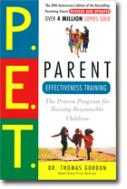
Parent Effectiveness Training: The Proven Program for Raising Responsible Children by Dr. Thomas Gordon shocks the reader into an entirely different mindset. There are two main reasons why people fail to implement the principles of Parent Effectiveness Training. Either they feel that they cannot afford to “surrender” their position of power in the parent-child relationship or, the idea of putting so much effort into a new pattern of communication is too exhausting.
by Dr. Thomas Gordon shocks the reader into an entirely different mindset. There are two main reasons why people fail to implement the principles of Parent Effectiveness Training. Either they feel that they cannot afford to “surrender” their position of power in the parent-child relationship or, the idea of putting so much effort into a new pattern of communication is too exhausting.
The Tuesday Book Club is spending the month of August studying Parent Effectiveness Training. There are free weekly teleconference discussions and if you are in Austin, a free live meeting on the Third Tuesday at Laura’s Library. Last week our teleconference focused on the front matter and first two chapters. Click here to listen and catch up.
Here are some discussion questions for chapters three through five
that will help you start to use the language of acceptance that is so necessary in a successful relationship.
Parent Effectiveness Training Chapter 3: How to Listen So Kids Will Talk to You: The Language of Acceptance
What example do you have of a child refusing to talk to a parent?
How is unacceptance communicated?
Name two ways to communicate acceptance non-verbally. Try these and record your results.
Write what your exact verbal response would be if your child came home and said:
“School just isn’t for me. I’ve decided not to go to college. There are so many other ways to succeed these days.”
“I wish I could figure out what is wrong with me. Susie used to like me but now she never comes to play. Every time I go to her house, she is playing with Brianna. They have fun and I just feel left out. I hate them.”
“How come I have to mow the lawn? Sam’s family has a gardener to do that stuff. You are not fair! This is child abuse! Nobody works as hard as I do!”
You are having another couple over for dinner. Your five year old burst into the room as you are enjoying the after-dinner conversation and shouts:
“You are all a bunch of stinking fish heads! I hate you and wish you never came here!”
Classify your responses according to the categories in Chapter 3. Do you tend to communicate acceptance or the opposite?
How many meanings does a typical verbal response carry?
Name three “door openers” you are willing to try. Record what happens when you try them out.
What is active listening?
Try it out on a stranger and record what happens.
Why should people learn the skill of active listening?
What are the six requirements for Active listening to be genuine?
What are the risks of active listening?
Parent Effectiveness Training Chapter 4: Putting Your Active Listening Skills to Work
What is the most important action a person must take to master active listening?
When is it most appropriate to use active listening?
What three classifications apply to any situation encountered in a relationship?
Why is it important to classify situations?
What does active listening help the child find?
Name five common mistakes to active listening.
Parent Effectiveness Training Chapter 5: How to Listen to Kids Too Young to Talk Much
What two requirements must be met to use active listening effectively in children less than 4 years old?
How do you “learn to listen accurately to non-verbal communication”?
What can a parent give a child if the parent listens accurately to non-verbal communication?
What do most parents do instead?
What is the long-term result of this choice?
An Unofficial Reader’s Journal to Parent Effectiveness Training, based on the 1975 edition of this classic is available as a free resource to you. Please join us Tuesday, August 3 at 7 PM CDT (512) 501-4531 enter the code 121014# for a live discussion of some of these questions and your experience as you read this manual on communication skills that will revolutionize every single relationship in which you engage.
Your comments and questions are welcome below. Remember, all it takes is one idea to change your world.
In friendship,
Lori L. Barr, M. D.
Vice President, MindTamers
Tags: Effectiveness Training, Lori L. Barr, MindTamers, Parent Effectiveness Training, Thomas Gordon
Educational Policy Books)
, about the past and future of American education. If you have an interest in the future of education perhaps as a parent, student, trustee or educator, you may want to read it. Our live discussion will be at Laura’s Library, Tuesday, May 17, 2011 at 6:30 CDT in Austin, Texas. If you at not in Austin, simply click the event link for information on how you can participate virtually.






